The annual meeting of the Psychonomic Society in Montreal drew to a close last Sunday. Following tradition (anything that lasts more than 4 years surely qualifies as a tradition?), I e-interviewed a few mainly junior researchers who were presenting posters at the meeting.
I hope this gives us a better sense of what the next generation of Psychonomes is up to and what they hope to achieve.
Specifically, I asked the authors four questions:
- What’s the punchline of your poster? What have we learned from it?
- What did you enjoy the most about #Psynom19?
- What would you change for future meetings (e.g. #Psynom20)?
- Does your research have any broader implications for the community or society as a whole?
Here are the posters and the responses from the first few authors who got back to me.
Please accept my apologies if you weren’t approached during the meeting: this sample was entirely arbitrary, and if you presented a poster and want to have it taken up on this blog, get in touch once you publish your work in a Psychonomics journal.
An Examination of Age-Related Differences in Attentional Control by Systems Factorial Technology. CHENG-TA YANG, SHULAN HSIEH and CHENG-JU HSIEH, National Cheng Kung University, MARIO FIFIC, Grand Valley State University, YEN-TING YU and CHUN-HAO WANG, National Cheng Kung University
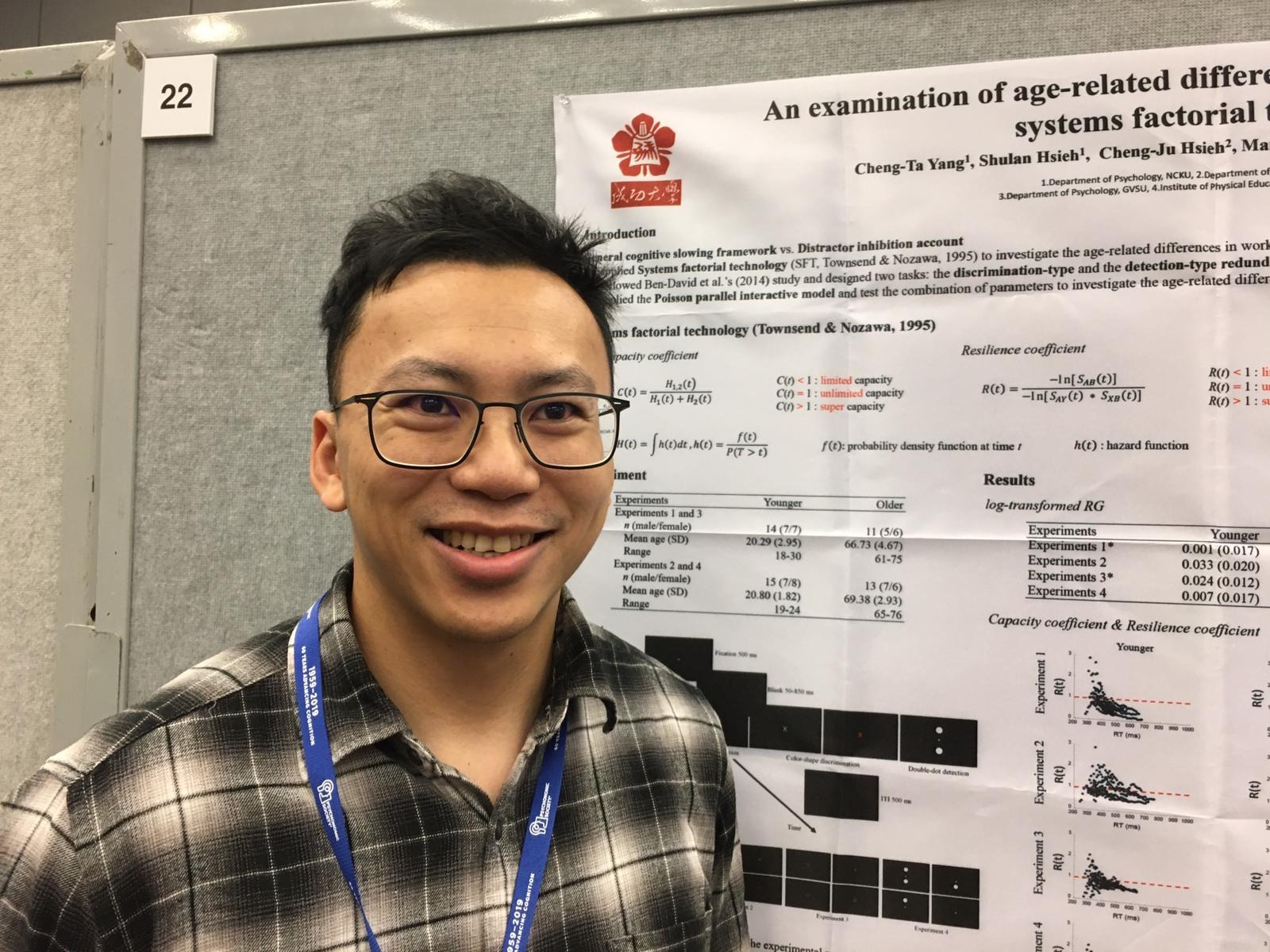
Cheng-ta replied as follows:
1. What’s the punchline of your poster? What have we learned from it?
The current study used a theory-driven methodology, systems factorial technology (SFT, Townsend & Nozawa, 1995) to study age-related differences in information processing efficiency. Both behavioral data and simulation results suggest that the inability of distractor inhibition can explain age differences. Specifically, in a parallel interactive model, by considering the decision criterion (i.e., older adults are more conservative) and violation of context invariance (i.e., older adults are less efficient in inhibiting distractors), we are able to recover the capacity signature for different age groups. The novel contribution of this study is to provide a model-based account for age differences.
2. What did you enjoy the most about #Psynom19?
I found lots of talks and posters interesting. I especially enjoyed the pre-conference meeting (i.e., configurable processing consortium) very much. For those meeting, only a limited number of participants were involved but we were able to spend a sufficiently long time together. This definitely helps us dig into the issue with extensive discussions. I also enjoyed seeing my old friends and colleagues and making new friends.
3. What would you change for future meetings (e.g. #Psynom20)?
One thing to mention is that everything seems so interesting to me, but I cannot attend all the parallel sessions at a time. And also, the scheduled is so compact. I would be happy to see if we can have a five-day Psychonomics meeting and make each day less tense.
4. Does your research have any broader implications for the community or society as a whole?
Of course. Attention control is a hot issue in the society. Also, cognitive aging attracts researchers’ interests. My advantage is to use the computational simulation approach to uncover the mechanism of this hot issue. I believe that my research would definitely inspire more researchers to use the computational way to solve the theoretical issues in their fields.
The Impact of Father-Child Play Interactions on Cognitive Development. EMILY E. FREEMAN and ERIN ROBINSON, University of Newcastle
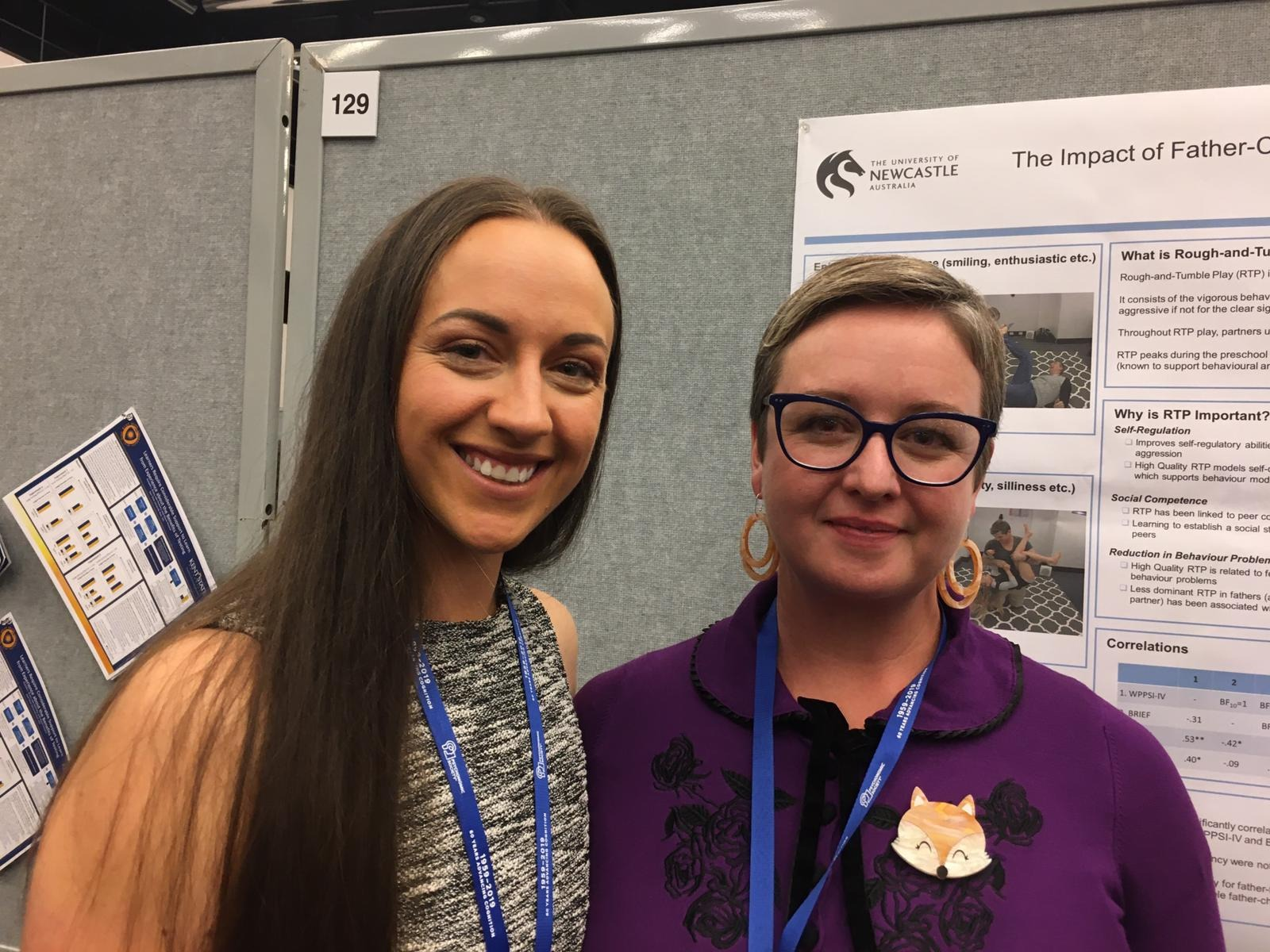
Emily and Erin replied as follows:
1. What’s the punchline of your poster? What have we learned from it?
The one-sentence version is that father-child rough-and-tumble play appears to be positively associated with a broad range of child development outcomes, including working memory ability. Our research has been showing that the fun, active, wrestling, competitive play that fathers often participate in with their children (usually at their child’s request) seems to be more than ‘just fun’. Children who frequently participate in high-quality rough-and-tumble play with their Dad (play that is warm, shares the dominance, and is physically engaging), tend to have better emotional self-regulation, higher levels of prosocial behaviour, and lower levels of aggression and externalising behaviours than their peers. Our current project shows that these relationships should be expanded from the emotional and social domains, to cognitive domains as well.
2. What did you enjoy the most about #Psynom19?
Definitely the wide variety of topics that were covered. Psychonomics is a great opportunity to hear about research outside of your own niche. Every talk and poster has something new and interesting to learn. It’s also great to see people from all degrees of expertise and experience mingling and sharing their work. (The location was great too – especially travelling from the awful 37+ degrees in Australia to somewhere nice and cold!)
3. What would you change for future meetings (e.g. #Psynom20)?
The 8 am starts are pretty tough when the jet lag has set in! An extra conference day, but with the same number of talks, so that you don’t have to make as many decisions about which ones to see would be fantastic too.
4. Does your research have any broader implications for the community or society as a whole?
Absolutely. Our work has implications for child development, parenting practices, and the importance of shifting our thinking towards a more father-inclusive environment when working with children and families. It also suggests that the current risk-averse environment that many people commented on when talking to us, may not be as beneficial as thought to a child’s development.
Children Infer Implicit Recommendations from Default Options. LIM LEONG and ADENA SCHACHNER, University of California, San Diego
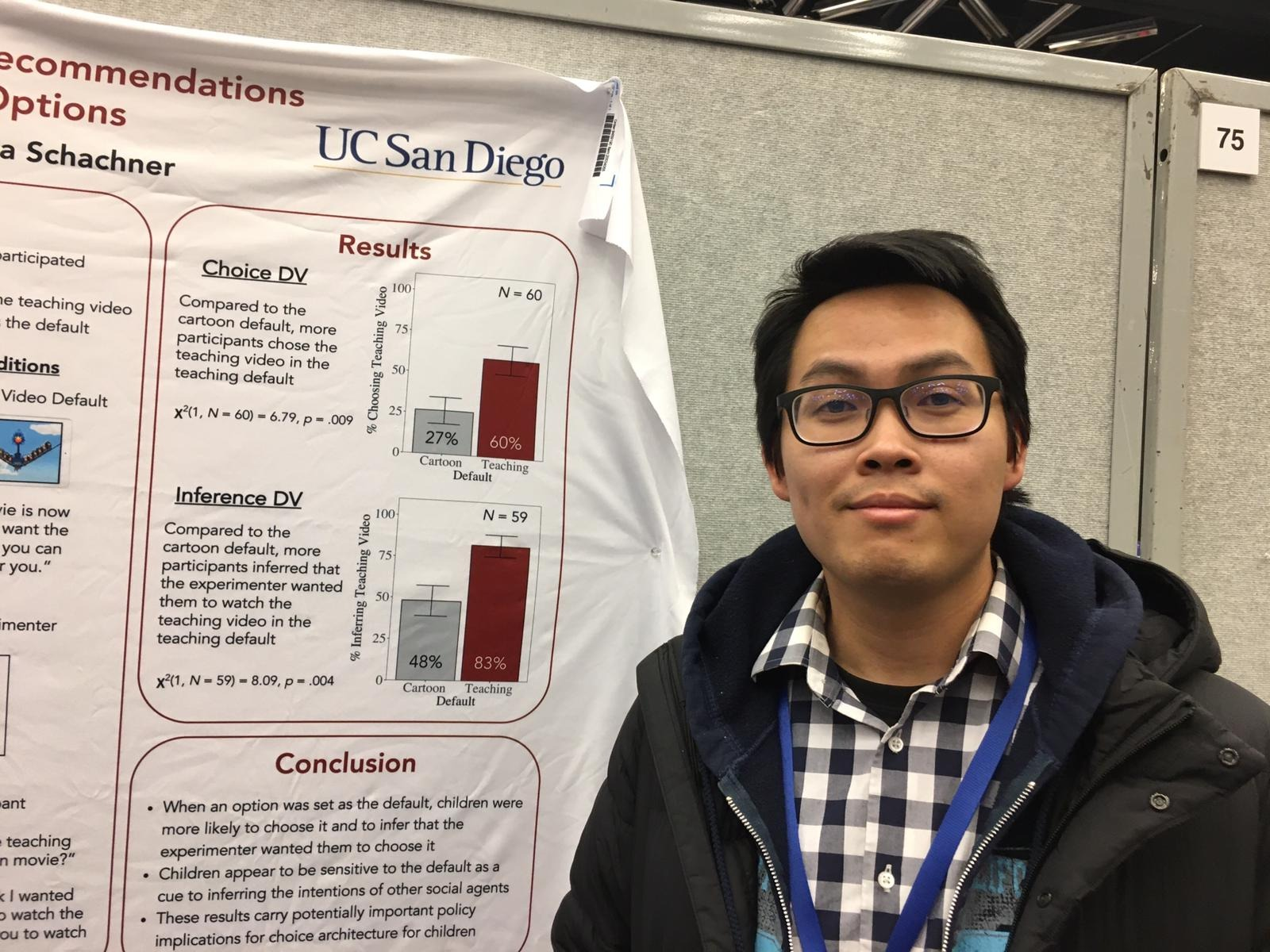
Lim replied as follows:
1. What’s the punchline of your poster? What have we learned from it?
Like adults, children are more likely to choose an option when it is set as the default, and to infer that the default option is an implicit recommendation.
2. What did you enjoy the most about #Psynom19?
Catching up with friends whom I haven’t seen in years.
3. What would you change for future meetings (e.g. #Psynom20)?
Definitely provide internet access at the convention. Also, be environmentally friendly and move away from printing the abstract book.
4. Does your research have any broader implications for the community or society as a whole?
My research has important implications for how to design effective behavioral interventions to influence children’s choices without limiting their freedom to choose.
State Effects of Brief Mindfulness Meditation on Working Memory and Mind-Wandering. MICHAEL F.S. BARANSKI, Kent State University
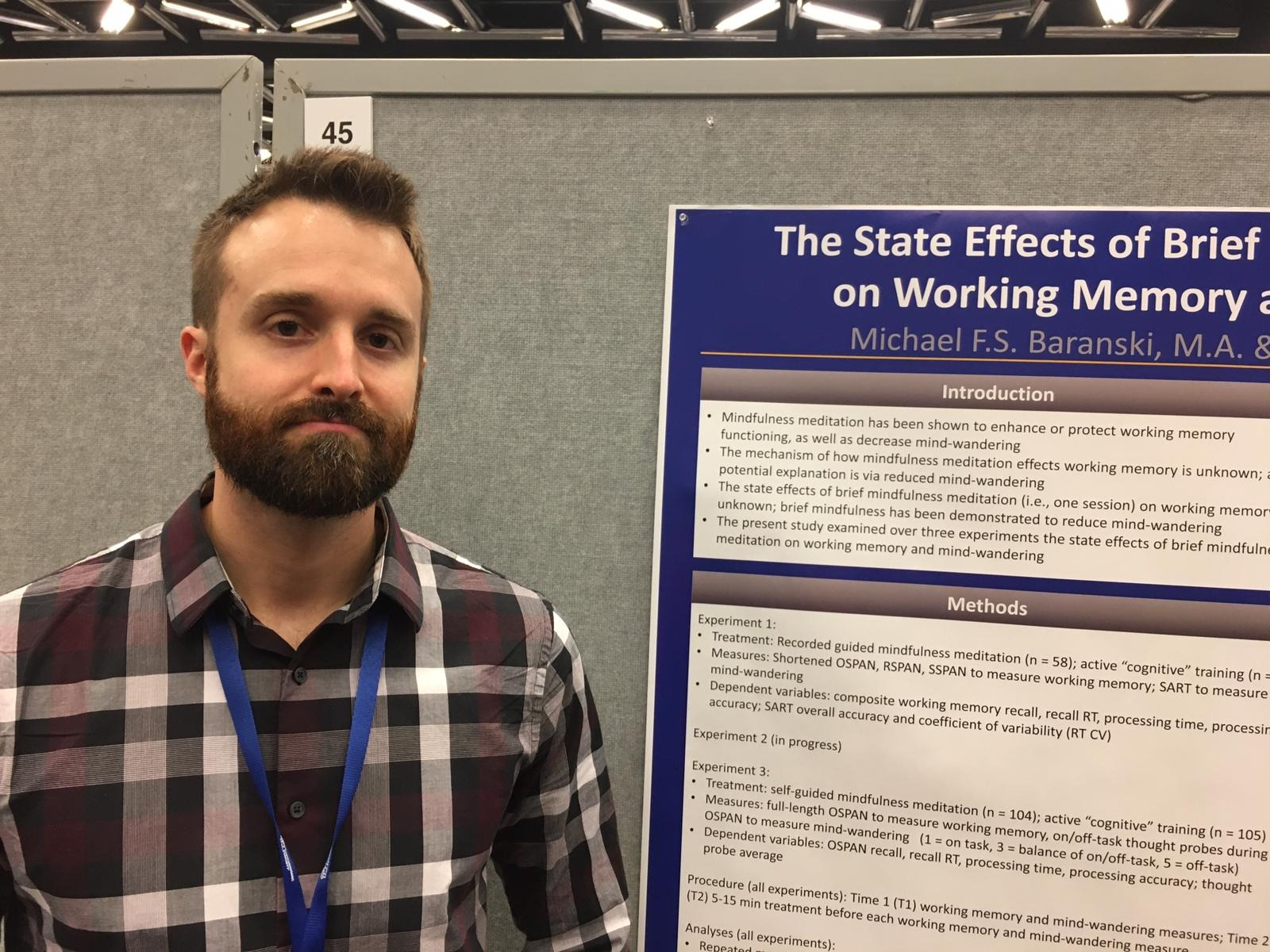
1. What’s the punchline of your poster? What have we learned from it?
Brief mindfulness meditation did not have state effects on working memory capacity nor mind-wandering, nor did those prone to mind-wandering differentially benefit from brief mindfulness meditation. However, brief mindfulness meditation protected working memory processing accuracy from decrements: over two experiments, the active control groups’ working memory processing accuracy significantly declined, whereas the mindfulness meditation groups’ working memory processing accuracy remained stable. Ongoing research will attempt to replicate these effects and determine their mechanism (e.g., protection from fatigue decrements).
2. What did you enjoy the most about #Psynom19?
Interacting with other researchers: answering their questions in regards to my research, finding out about their research, and proposing novel research questions of mutual interest.
3. What would you change for future meetings (e.g. #Psynom20)?
No suggestions; I enjoyed the conference.
4. Does your research have any broader implications for the community or society as a whole?
Yes. If brief mindfulness meditation is efficacious for temporarily improving or protecting working memory, this can have real-world impact in situations where working memory is required (e.g., reasoning, problem-solving, learning) and especially when it is subject to decrement (e.g., during stress, for those with anxiety). Brief mindfulness meditation may also offer a “preview” of more durable trait changes that may result from long-term practice. This research can uncover the unique benefits of mindfulness practice, or determine that no such benefits exist. Either way, this will inform individuals’ and society’s practices for improving or protecting cognition.
Directed Forgetting Reduces Proactive Interference Within Working Memory Beyond a Baseline Encode-Only Condition. SARA B. FESTINI, University of Tampa
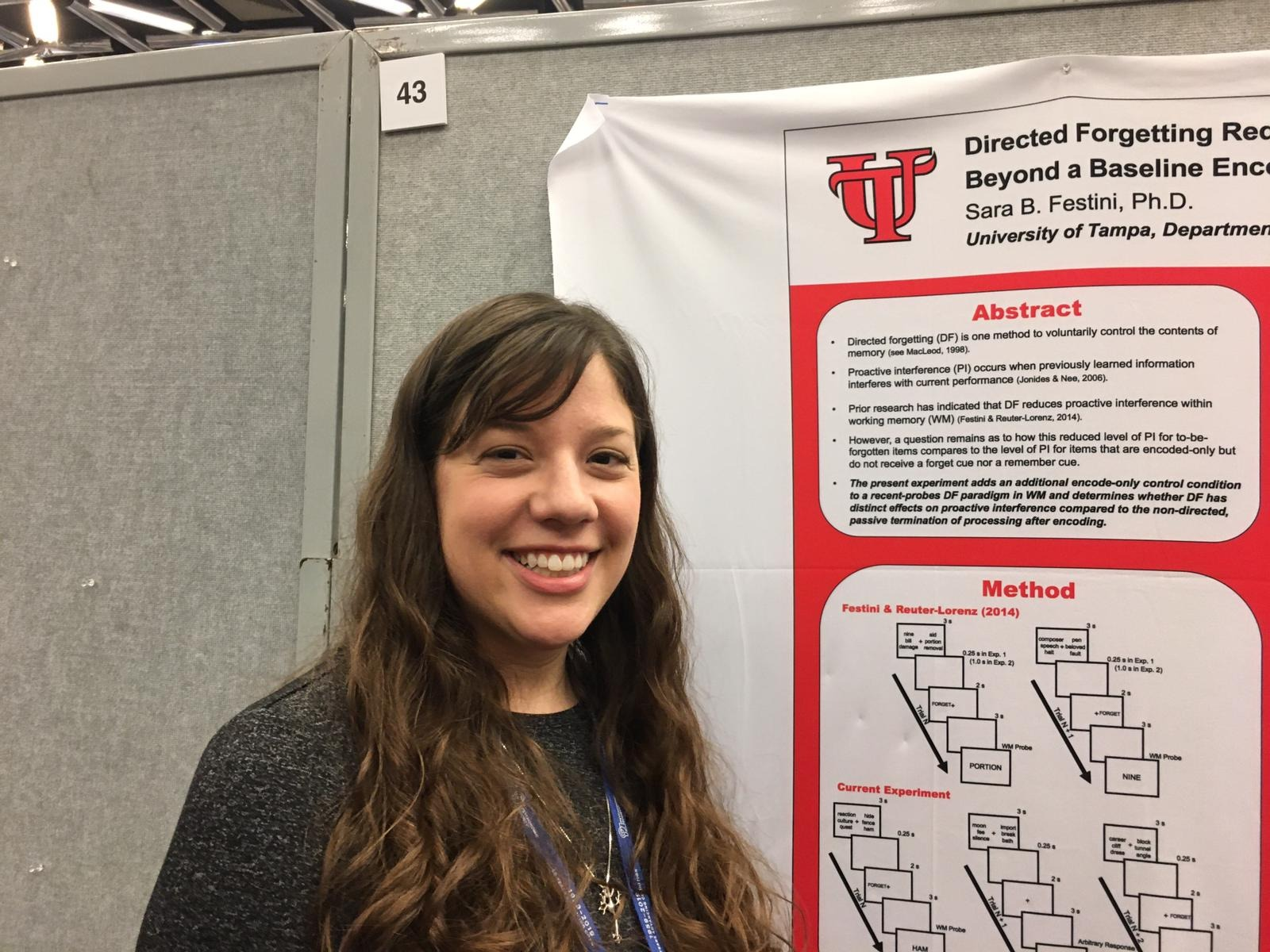
1. What’s the punchline of your poster? What have we learned from it?
My research provided evidence that directed forgetting is a goal-directed process that is distinct from the simple termination of processing after encoding. Directed forgetting reduced proactive interference within working memory, whereas an encode-only condition exhibited similar proactive interference as a to-be-remembered condition.
2. What did you enjoy the most about #Psynom19?
Psychonomics is one of my favorite research conferences because of its in-depth focus on the mind. I enjoyed being able to discuss research ideas with other cognitive psychologists who conduct similar studies and hearing about the latest developments in the field.
3. What would you change for future meetings (e.g. #Psynom20)?
Although I imagine that determining the schedule of the conference is particularly difficult, it would be nice to have fewer overlapping sessions. For example, the cognitive control sessions sometimes overlapped with the memory sessions, and I would have preferred to be able to attend both sessions.
4. Does your research have any broader implications for the community or society as a whole?
Yes, my research examines the benefits and mechanisms of removing irrelevant or outdated information from working memory. We encounter so much information as we go through our daily lives. Voluntarily disregarding some of that information can render it less susceptible to memory interference.
Effects of a Neutral Auditory Warning Signal on Performance of a Two-Choice Spatial Reaction Task. TIANFANG HAN and ROBERT W. PROCTOR, Purdue University
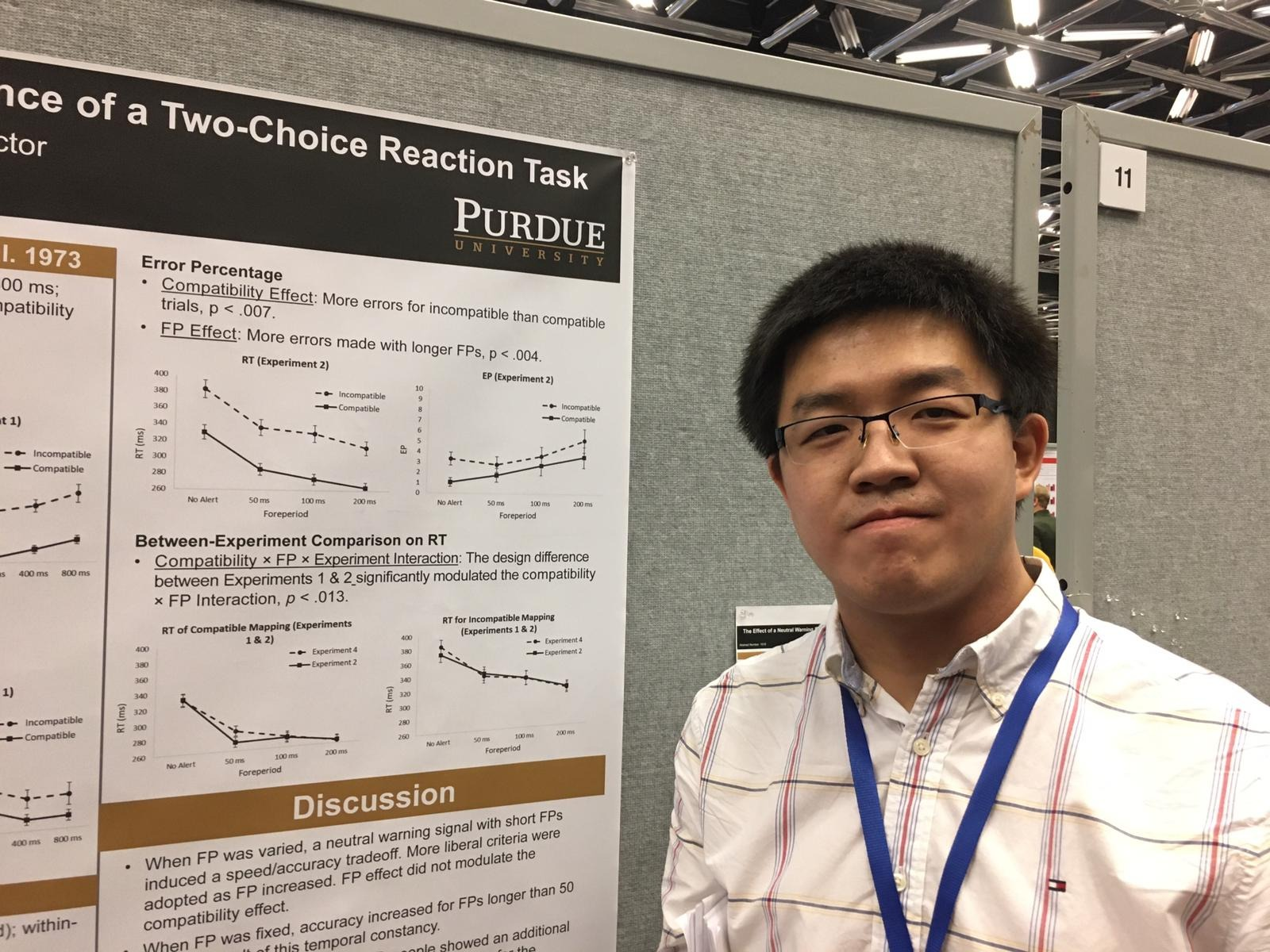
1. What’s the punchline of your poster? What have we learned from it?
The findings of our experiments implied that a neutral warning signal presented shortly before the target stimulus will not improve information processing unless the same foreperiod was practiced repeatedly. Moreover, the well-known speed/accuracy tradeoff has both a stimulus-driven objective facet and a bias-driven subjective facet which can interact with each other.
2. What did you enjoy the most about #Psynom19?
The most enjoyable benefit from this year’s annual meeting was to find and interact with people that are focused on the same or similar topic. We shared ideas and provided feedback to each other’s research. It was a great gain in terms of both happiness and valuable information.
3. What would you change for future meetings (e.g. #Psynom20)?
Free Wifi should be provided not only in the poster session but to the whole meeting area. And the abstract book should be made lighter to carry around.
4. Does your research have any broader implications for the community or society as a whole?
Seemly irrelevant experiment design factors like RT feedback after each trial could have significant influence on the data pattern. And studies focused on cost-benefit analysis should always be cautious about whether the same benefit will appear under bigger time pressure which can not be easily created in lab scenarios.
